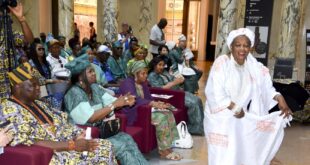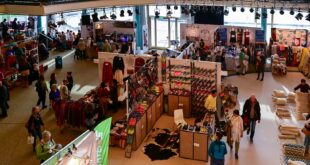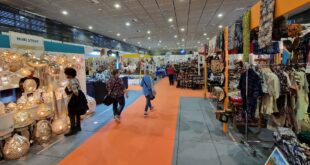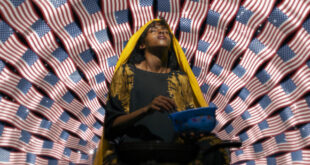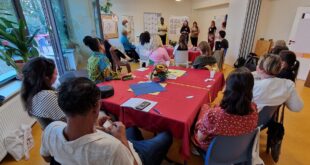Edo State Commissioner of Local Government and Community Affairs, Hon. Monday Osaigbovo, recently paid a courtesy call on Nigeria’s Ambassador to Germany, HE Alhaji Maitama Tuggar, in his office in Berlin.
Mr Osaigbovo was accompanied on the visit by Barrister Efosa Ogieriakhi, president of Edo in Diaspora Worldwide, Mr Austin Imade, Director of Edo Cultural Festival Germany, and several other Germany-based Edo community leaders.
The ambassador received the delegation on 2 December in the company of principal officials of the Embassy, including Alhaji Mohammed Bello Musa Anka, Minister/Consular & Immigration, Mr Peter J. Lambat, Minister/Information, Culture & Education and Mrs Foluke Atanda, Head of Chancery.

The commissioner thanked the ambassador for granting him audience and explained that his visit to Germany was to seek greater co-operation with the German authorities and the Nigerian embassy on the issues of migration and the repatriation of historical artefacts from the former Kingdom of Benin in German museums. The 15th to 19th-century bronze sculptures and ivory carvings are among Africa’s most spectacular works of art.
Mr Osaigbovo expressed the gratitude of the government and people of Edo State to Ambassador Tuggar for his immense efforts for the repatriation of the artefacts, scattered across the world as a result of the British invasion of the Benin Kingdom in 1897* when the priceless pieces were looted and taken to the UK, from where they were auctioned and sold to collectors across Europe. “We’re aware in Edo State that you’ve been making strenuous efforts to ensure the return of the artworks and we’re grateful for your efforts,” he said.
Commissioner Osaigbovo informed the ambassador that Governor Godwin Obaseki and the Oba of Benin would jointly visit Germany next year and he solicited the support of the Nigerian mission to ensure the success of the visit.
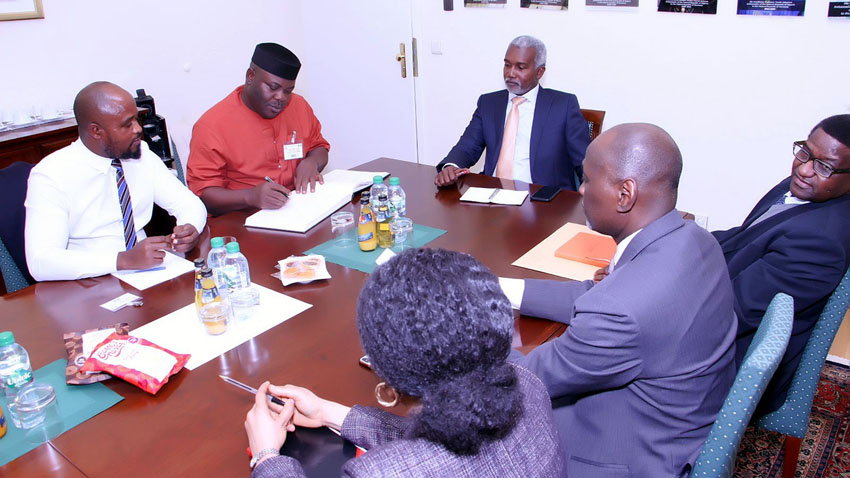
The commissioner briefed the ambassador on the efforts of the Edo State government to revive technical education to equip youths with vocational skills to enable them become gainfully employed. This, the Obaseki administration believes, would discourage irregular migration, he added.
In his response, Ambassador Tuggar said Edo indigenes constituted the largest group in the Nigerian community in Germany. “We are working closely with the German government to address the issue of migration,” he said.
“I urge the state government to work with us on migration especially on tackling the root causes of irregular migration.”
The envoy said the federal government recognized the importance of artworks in giving Nigerian youths a sense of identity and inculcating in them pride in their cultural and creative heritage.
“Keeping these artworks away from Nigeria denies our people’s access to these invaluable cultural assets,” he noted.
“These priceless works of art inspire the creativity of Europeans who have had access to them for many years.”
The extraordinary artefacts, mostly bronze sculptures and ivory carvings from the 15th to 19th-century, are considered to be among Africa’s most spectacular works of art.
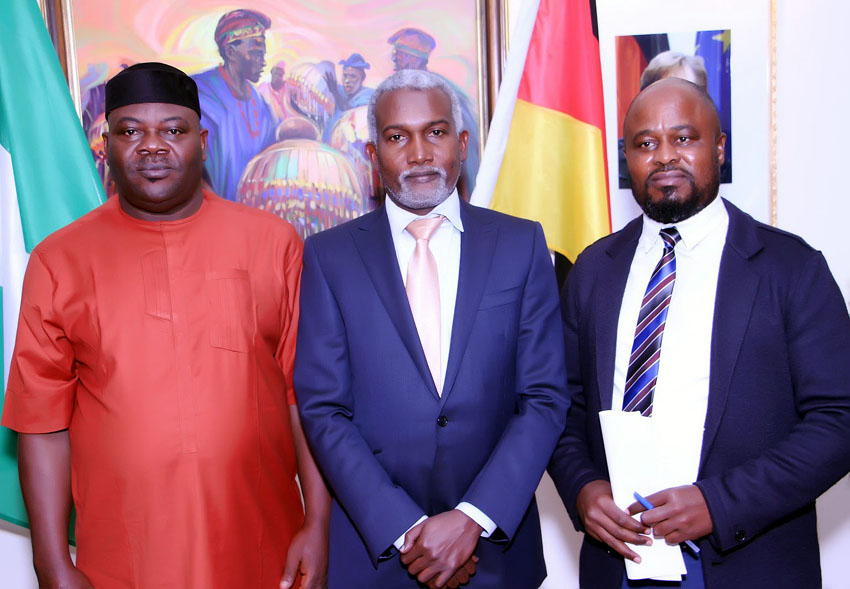
Speaking on efforts for the return of the artworks to Nigeria, the envoy said it’s encouraging that Europeans were not adverse to the idea of taking them back to where they came from. “We only have to continue working at it,” he added, reiterating that the return of the cultural and historical artefacts to Nigeria was a priority of the Embassy.
The envoy however identified two major challenges to the return of all the artworks as Nigeria does not have a documented inventory of the stolen artworks and neither does the country know which artworks are kept where. The Ethnological Museum of the National Museums in Berlin (Ethnologisches Museum of the Staatliche Museen zu Berlin) alone holds about 500 pieces of the artworks, for example.
The ambassador also spoke of the Embassy’s efforts on the issue. “We have written to the office of the chancellor to return all our artworks in their museums,” he revealed. “They have even established an office to handle such requests,” he added.
“The issue is gaining a lot of traction,” he said, calling for the coordination of efforts for the return of the artworks.
The ambassador mentioned the Benin Dialogue Group, which has been conducting talks and consultation on the issue.
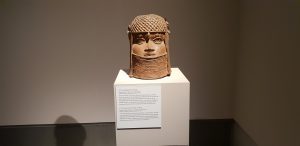
Initiated in 2010, the Benin Dialogue Group brings together museums from Germany, the UK, the Netherlands, Austria and Sweden with representatives of Nigeria’s National Commission for Museums & Monuments and the royal court of Benin.
Alhaji Tuggar said the group was not a viable vehicle to lead the return efforts as the federal government and embassy were not involved in its activities.
READ ALSO Nigerian Embassy in Germany denies complicity in deportation of Nigerians
“We should not allow ourselves to be divided on the issue; we need to speak with one voice,” he warned.
Ambassador Tuggar mentioned the Embassy’s communication with a Hamburg museum on the issue only to be informed they were already in contact with the Benin Dialogue Group, which is supporting the construction of a museum in Benin where some of the artworks could be reunited for display under conditions that have not been agreed or revealed.
Contributing to the conversation, Minister Peter Lambat said all actions taken so far by the Embassy had been communicated to the National Commission for Museums & Monuments, the Oba’s Palace and the Edo State government. “We have made it clear that the Embassy should be the arrowhead of efforts” to retrieve the artworks in Germany, he added.
In his comments, Barrister Ogieriakhi, a Berlin-based legal practitioner, said the issue of the Benin artworks was of great importance to all Edo people. He explained that the commissioner’s visit was to give impetus to the agitation for the return of the artefacts. He assured that the royal court of Benin and the state government were interested to work closely with the embassy on the issue.
Femi Awoniyi
*British forces raided and destroyed Benin City in today’s Nigeria in 1897. They looted thousands of invaluable works of art from the burnt royal palace and sold it to Western museums and private art collectors. After London, Berlin has the second largest collection of the artefacts, many of which have never been shown to the public.
READ ALSO Berlin demonstrators demand return of Benin artworks to Nigeria
 THE AFRICAN COURIER. Reporting Africa and its Diaspora! The African Courier is an international magazine published in Germany to report on Africa and the Diaspora African experience. The first issue of the bimonthly magazine appeared on the newsstands on 15 February 1998. The African Courier is a communication forum for European-African political, economic and cultural exchanges, and a voice for Africa in Europe.
THE AFRICAN COURIER. Reporting Africa and its Diaspora! The African Courier is an international magazine published in Germany to report on Africa and the Diaspora African experience. The first issue of the bimonthly magazine appeared on the newsstands on 15 February 1998. The African Courier is a communication forum for European-African political, economic and cultural exchanges, and a voice for Africa in Europe.


















